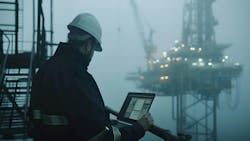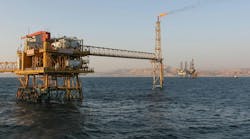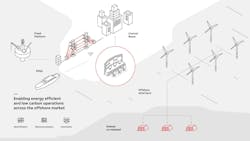ADIPEC 2025: ABB's SVP discusses offshore digitalization and decarbonization goals in the UAE
Key Highlights
- Automation and digitalization are enabling efficient, safe and low-emission offshore energy operations.
- Predictive analytics help prevent failures, reduce downtime and optimize performance in harsh offshore environments.
- Collaboration with regional stakeholders ensures automation strategies align with national sustainability targets and promote local talent development.
- Emerging technologies like AI, digital twins and edge computing enhance autonomy and decision support for offshore energy projects.
By Ariana Hurtado, Editor-in-Chief
As the offshore energy sector accelerates its transition toward low-carbon operations, automation and digitalization are emerging as critical enablers.
Just ahead of the ADIPEC Exhibition and Conference, taking place in Abu Dhabi this week, Offshore spoke with Bjarte Pedersen, senior vice president for IMEA of ABB’s Energy Industries division, to explore how the company is helping offshore operators in the UAE and broader region meet decarbonization goals, enhance asset reliability and embrace emerging technologies.
Offshore: In what ways is ABB integrating automation and digital technologies to support decarbonization goals across offshore energy operations in the India, Middle East and Africa (IMEA) region?
Pedersen: Automation and digitalization are the backbone of the energy transition. At ABB, we see automation as the true enabler. It ensures that assets operate efficiently, safely and with fewer emissions. Digitalization is the force multiplier, amplifying automation’s impact through data insights and intelligent decision-making.
We can help operators integrate renewables and low-carbon systems into existing offshore infrastructures to ensure that the path to decarbonization does not compromise reliability and productivity. Our solutions connect automation, electrical and digital systems into a single operational view, allowing operators to optimize performance and minimize energy waste across complex offshore assets.
Offshore: How are ABB’s energy transition initiatives addressing the unique challenges of offshore asset reliability, especially in harsh environments like the Arabian Gulf?
Pedersen: Offshore operations demand exceptional reliability, even more so in extreme environmental conditions. In the Arabian Gulf, characterized by high temperatures, salinity and humidity, ABB’s solutions are designed for resilience.
Our automation systems feature built-in redundancy, cybersecurity and remote operation capabilities. This ensures continuous operation, even under extreme conditions. Moreover, digital twin technology allows operators to simulate performance, test scenarios and predict failures before they occur, reducing downtime and risk.
Offshore: Can you share lessons learned from the Al Dhafra solar project that could be applied to offshore renewable developments, such as floating solar or offshore wind integration?
Pedersen: Al Dhafra PV2, the world’s largest single-site solar plant, has shown how intelligent automation can maximize renewable efficiency at scale. ABB’s distributed control system technology unifies millions of datapoints across the plant, helping operators turn real-time insights into actionable decisions.
Whether managing solar arrays or offshore wind farms, integrating automation with digitalization ensures every component operates in sync.
Projects like Al Dhafra prove that when these two elements are embedded from the start, large-scale clean energy can be delivered with consistency and reliability.
Offshore: What role do real-time monitoring and predictive analytics play in optimizing offshore production and reducing unplanned downtime across the energy value chain?
Pedersen: Real-time monitoring and predictive analytics transform how operators manage offshore assets. By connecting sensors, control systems and analytics, we can predict maintenance needs before failures happen and fine-tune performance to avoid inefficiencies.
AI-driven analytics turn operational data into actionable intelligence, identifying patterns that might indicate equipment fatigue, corrosion or inefficiencies. This data-driven insight helps operators reduce unplanned downtime, improve energy efficiency and make better, faster decisions. It’s about turning visibility into value and data into performance.
Offshore: How is ABB collaborating with national oil companies (NOCs) and regional operators to align automation strategies with evolving regulatory frameworks and sustainability targets?
Pedersen: ABB works closely with NOCs and regional partners to ensure automation strategies support not only operational goals but also national sustainability ambitions. In the UAE, for example, ABB contributes directly to the Energy Strategy 2050, which aims to triple renewable energy capacity and cut power generation emissions by 70% by 2050.
We also support Emiratization and local talent development through ABB’s In-Country Value (ICV) initiatives, ensuring that digital and automation expertise are developed locally. By aligning technology, policy and people, we create a foundation for a more sustainable and inclusive transition.
Offshore: Looking ahead, what emerging technologies or digital capabilities do you see as most transformative for offshore energy operations in the Middle East?
Pedersen: The next decade will be defined by autonomy, AI and advanced analytics. AI-enabled decision support, digital twins and edge computing will further evolve autonomous operations. This shift will enhance safety, reduce emissions and optimize assets. The Middle East is well positioned to lead this change, leveraging its digital infrastructure and commitment to innovation.
Automation and digitalization will continue to be the backbone of the energy transition. Every gain in efficiency and every minute of uptime compounds into a more resilient, sustainable offshore energy future.
ABB will be exhibiting at booth 3110 in Hall 3 at the ADIPEC Exhibition and Conference this week in Abu Dhabi, UAE.
From ABB’s Energy Industries team, Gino Hernandez, global digital business leader, will be presenting "Building blocks for a resilient energy future: The IoT in energy operations" at 4:05 p.m. on Wednesday, Nov. 5, in Conference Room A.
*Offshore is a media partner of ADIPEC 2025.
About the Author
Ariana Hurtado
Editor-in-Chief
With more than a decade of copy editing, project management and journalism experience, Ariana Hurtado is a seasoned managing editor born and raised in the energy capital of the world—Houston, Texas. She currently serves as editor-in-chief of Offshore, overseeing the editorial team, its content and the brand's growth from a digital perspective.
Utilizing her editorial expertise, she manages digital media for the Offshore team. She also helps create and oversee new special industry reports and revolutionizes existing supplements, while also contributing content to Offshore's magazine, newsletters and website as a copy editor and writer.
Prior to her current role, she served as Offshore's editor and director of special reports from April 2022 to December 2024. Before joining Offshore, she served as senior managing editor of publications with Hart Energy. Prior to her nearly nine years with Hart, she worked on the copy desk as a news editor at the Houston Chronicle.
She graduated magna cum laude with a bachelor's degree in journalism from the University of Houston.




